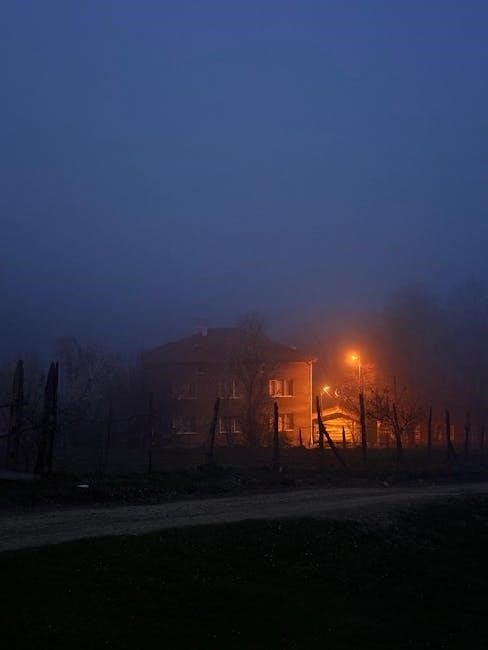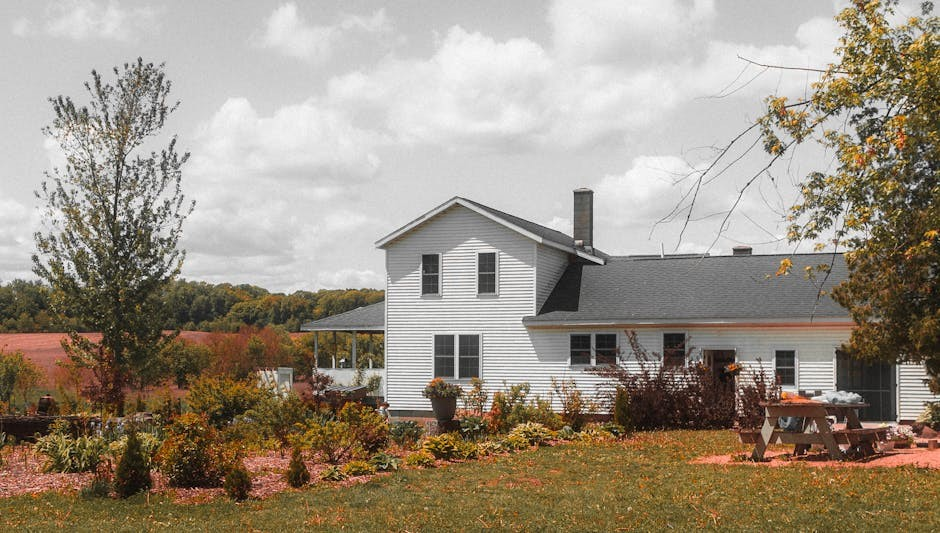Edgar Allan Poe’s The Fall of the House of Usher is a masterful tale of horror‚ exploring themes of madness‚ isolation‚ and familial decay. The story follows an unnamed narrator visiting his childhood friend‚ Roderick Usher‚ at his eerie mansion‚ where dark secrets and supernatural elements unfold. Poe’s vivid descriptions and psychological depth create a haunting atmosphere‚ cementing the story’s place in Gothic literature.
Brief Biography of Edgar Allan Poe
Edgar Allan Poe (1809–1849) was a celebrated American writer‚ poet‚ and literary critic‚ renowned for his pioneering work in detective fiction and horror. Born in Boston‚ Poe experienced a tumultuous childhood‚ losing his parents at a young age and being taken in by the Allan family in Virginia. He attended the University of Virginia and later served in the U.S. Army. Poe’s literary career flourished in the 1830s and 1840s‚ with notable works like The Raven and The Fall of the House of Usher. His writing often explored themes of madness‚ death‚ and the human psyche. Despite his success‚ Poe struggled with financial instability and personal hardships‚ including the early death of his wife‚ Virginia. His mysterious death in 1849 remains a subject of speculation‚ adding to his enigmatic legacy in American literature.
Historical Context of the Short Story
The Fall of the House of Usher‚ published in 1839‚ is set against the backdrop of the early 19th century‚ a time of social and economic transformation in the United States. The story reflects the era’s fascination with the supernatural and the darker aspects of human psychology. During this period‚ the Industrial Revolution was reshaping society‚ and urbanization was altering traditional ways of life‚ creating a sense of unease. Poe’s work taps into these anxieties‚ exploring themes of decay and madness. The Gothic revival movement‚ popular at the time‚ also influenced the story’s eerie atmosphere and focus on the mysterious and macabre. The historical context underscores the story’s exploration of isolation‚ family curses‚ and the crumbling of old aristocratic orders‚ resonating with the fears of a society in flux.

Plot Structure and Summary
The narrator visits his childhood friend Roderick Usher‚ who suffers from a mysterious illness. Roderick believes their house is alive and cursed‚ while his sister Madeline is ill. After Madeline’s death‚ Roderick entombs her in the house‚ but strange noises suggest she may still be alive. The story culminates in the collapse of the house‚ mirroring the Usher family’s demise.

The Unnamed Narrator’s Arrival at the House of Usher
The story begins with an unnamed narrator traveling to the House of Usher on a dull‚ dark‚ and soundless day. The narrator‚ a childhood friend of Roderick Usher‚ has been summoned to the mansion due to Roderick’s mysterious illness. Upon approaching the house‚ the narrator is struck by its eerie and decaying appearance‚ which evokes a sense of dread. The house seems to loom over the surrounding landscape‚ exuding an aura of gloom and decay. The narrator’s arrival sets the tone for the unfolding events‚ as the oppressive atmosphere of the house hints at the dark secrets and tragic fate that await within its walls. The narrator’s initial impressions of the house and its inhabitants foreshadow the horror and madness that will soon unfold.
The Condition of Roderick and Madeline Usher
Roderick Usher‚ the master of the house‚ is in a state of severe mental and physical distress. He believes his family is cursed and suffers from heightened sensitivities‚ fearing an impending doom. His sister‚ Madeline‚ is similarly afflicted‚ experiencing mysterious and unexplained bouts of illness. Roderick describes her condition as a long-standing malady‚ though its exact nature remains unclear. Both siblings appear fragile and isolated‚ their health seemingly intertwined with the decaying house. Roderick’s anxiety and Madeline’s elusive sickness create an atmosphere of unease‚ hinting at deeper psychological and supernatural forces at play. Their conditions are central to the story’s dark unfolding‚ as their deteriorating health mirrors the crumbling house itself. The siblings’ enigmatic illnesses captivate the narrator‚ intensifying the mystery surrounding the Usher family.
The Mysterious Illness and Family Curse
The Usher family is believed to be under a mysterious curse‚ contributing to Roderick and Madeline’s deteriorating health. Roderick attributes their suffering to an ancestral hex‚ while the narrator perceives their conditions as symptoms of psychological distress. Madeline’s illness is particularly enigmatic‚ described by Roderick as a long-standing malady with no clear cause. Her eventual disappearance and entombment within the house further shroud the family in mystery. The narrator witnesses Roderick’s growing instability‚ as he becomes convinced that the house itself is alive and exerting a malign influence. The intertwining of physical and supernatural elements creates an atmosphere of dread‚ suggesting that the Usher family’s fate is inescapably tied to their cursed lineage. This dark legacy underscores the story’s themes of decay and the inescapability of fate. The mysterious illness and family curse are central to the unfolding tragedy.

Main Characters in “The Fall of the House of Usher”
Roderick Usher‚ a mentally unstable aristocrat‚ struggles with mysterious illnesses. Madeline‚ his enigmatic sister‚ suffers from an unexplained malady; The unnamed narrator‚ a childhood friend‚ observes the eerie events unfold.
Roderick Usher: His Mental and Physical State

Roderick Usher is portrayed as a mentally unstable and physically frail character‚ suffering from a mysterious illness. His condition is marked by heightened sensitivity‚ known as hyperesthesia‚ which makes him acutely aware of his surroundings. He believes the house is alive and exerts a malevolent influence on its inhabitants. Physically‚ Roderick appears gaunt‚ with sunken eyes and a pale complexion‚ reflecting his deteriorating health. His mental state is further destabilized by the death of his sister‚ Madeline‚ whom he entombs within the house. Roderick’s grip on reality falters as the story progresses‚ leading to a tragic climax. His physical and mental decline mirrors the crumbling house‚ symbolizing the intertwined fate of the Usher family and their ancestral home.
Madeline Usher: The Enigmatic Sister
Madeline Usher is Roderick’s twin sister‚ shrouded in mystery and suffering from an undisclosed illness. Her presence is fleeting‚ as she is often bedridden and seemingly near death. Madeline’s character is defined by her ethereal beauty and an unsettling calmness‚ which contrasts with Roderick’s anxiety. Her entombment in the house by Roderick‚ who believes she has died‚ is a pivotal moment. However‚ Madeline’s return from the tomb is a shocking and supernatural event that accelerates the story’s tragic conclusion. Her relationship with Roderick is deeply intertwined‚ suggesting a bond that transcends life and death. Madeline’s enigmatic nature and her ultimate fate contribute to the eerie and haunting atmosphere of the story‚ leaving readers with a lasting sense of unease and wonder.
The Narrator: Role and Significance in the Story
The unnamed narrator serves as the audience’s lens into the eerie world of the Usher family. As a childhood friend of Roderick‚ he is summoned to the mansion‚ providing an outsider’s perspective on the unfolding events. His role is crucial in building suspense and credibility‚ as his rational mindset contrasts with the supernatural elements. The narrator’s skepticism and growing fear mirror the reader’s experience‚ making him a relatable character. His presence also allows Roderick to express his inner turmoil‚ revealing the psychological depth of the story. Ultimately‚ the narrator’s escape from the collapsing house symbolizes the destruction of the Usher legacy‚ leaving the reader with a haunting impression of the events. His role underscores the themes of isolation and the blur between reality and madness.

Themes and Symbolism
Themes include madness‚ isolation‚ and supernatural elements‚ symbolized by the decaying house‚ reflecting the Usher family’s dark fate and psychological turmoil.
Madness and the Unreliable Narrator
Mental instability is central to the story‚ as Roderick Usher’s deteriorating psyche drives the plot. The narrator’s credibility is questionable‚ as his perceptions may be skewed by the eerie atmosphere. This unreliability adds depth‚ leaving readers to discern reality from illusion. The blurred lines between madness and reality heighten suspense‚ making the narrator’s account both intriguing and suspect. His inability to fully comprehend the events underscores the mysterious nature of the Usher family’s plight. Through this narrative technique‚ Poe masterfully crafts a sense of ambiguity‚ drawing readers into the dark‚ unsettling world of the Usher mansion.
The House as a Symbol of the Usher Family
The House of Usher serves as a vivid symbol of the family’s decaying legacy and psychological turmoil. Its crumbling structure mirrors the physical and mental deterioration of Roderick and Madeline. The house’s eerie‚ almost sentient presence evokes a sense of dread‚ suggesting it is alive and intertwined with the family’s fate. Its isolation and dark history symbolize the Usher family’s disconnection from the outside world and their entrapment in a cycle of madness. The house’s supernatural elements‚ such as the unexplained sounds and movements‚ further emphasize its role as a character in the story. Ultimately‚ the house’s collapse symbolizes the downfall of the Usher family‚ illustrating the inescapable connection between their lives and the decaying mansion.
Isolation and the Supernatural
Isolation plays a central role in The Fall of the House of Usher‚ as the mansion’s remote location creates an eerie‚ disconnected atmosphere. The supernatural elements‚ such as the house’s seemingly sentient nature and unexplained phenomena‚ heighten the sense of dread. Roderick Usher’s belief in the house’s consciousness and the mysterious illness afflicting Madeline further blur the line between reality and the supernatural. The isolation of the Usher family fosters an environment of madness and despair‚ while the supernatural occurrences amplify the story’s tension and suspense. Poe masterfully uses these elements to explore themes of psychological decay and the inescapable influence of the past. The combination of isolation and the supernatural creates a haunting narrative that lingers in the reader’s imagination‚ leaving a lasting impression of the Usher family’s tragic fate and the house’s ominous presence.

Analysis of Key Elements
The story’s eerie setting‚ complex characters‚ and themes of madness and isolation create a haunting atmosphere. Supernatural elements and psychological tension deepen the narrative’s unsettling nature and mystery.
The Setting and Its Impact on the Mood
The story is set in a decaying‚ ancient mansion surrounded by a dismal landscape‚ creating an eerie and oppressive atmosphere. The house‚ with its crumbling architecture and eerie towers‚ symbolizes the Usher family’s decline and Roderick’s mental instability. The dark‚ soundless day and the tarn‚ a stagnant lake‚ further heighten the sense of gloom and isolation.
The setting reinforces the themes of madness and supernatural horror‚ as the house itself seems alive‚ mirroring the characters’ psychological states. The labyrinthine interior and hidden rooms add to the mystery‚ while the decaying exterior reflects the family’s cursed fate. This haunting environment instills fear and dread‚ making the setting a pivotal element in shaping the story’s chilling mood.
Foreshadowing and Suspense
Poe masterfully employs foreshadowing and suspense to heighten tension in The Fall of the House of Usher. The narrator’s description of the house as having “a ghastly pallor” and the “rank sedges” in the tarn hints at the impending doom. Roderick’s letters‚ filled with anguish‚ foreshadow his deteriorating mental state and the mysterious forces haunting him. The eerie atmosphere‚ with its “dull‚ dark‚ and soundless” day‚ creates an unsettling sense of dread.
The entombment of Madeline and the unexplained noises in the house build suspense‚ suggesting supernatural elements at play. These techniques keep readers engaged‚ anticipating the tragic collapse of both the family and their decaying mansion‚ which ultimately mirrors the characters’ psychological unraveling.
The Climax and the Fall of the House
The climax of The Fall of the House of Usher unfolds during a tempestuous night‚ heightening the eerie atmosphere. Roderick Usher‚ overwhelmed by fear‚ reveals his belief in the house’s sentience and the impending doom of his family. As the storm intensifies‚ a loud crash of thunder coincides with Madeline’s appearance‚ startling Roderick to death. The narrator flees in horror‚ and as he looks back‚ the House of Usher catastrophically collapses into the tarn‚ symbolizing the end of the Usher lineage. This dramatic conclusion underscores the inescapable fate tied to the decaying mansion‚ leaving the narrator and readers with a chilling sense of irreversible destruction and the triumph of dark forces.

Ending and Interpretations
The Fall of the House of Usher ends with the house collapsing‚ killing Roderick and Madeline‚ symbolizing the end of the Usher lineage and the triumph of dark forces‚ leaving a sense of final destruction.
The Final Collapse of the House
The final collapse of the House of Usher is a climactic and symbolic event in the story. As Roderick and Madeline meet their deaths‚ the mansion crumbles‚ mirroring the family’s demise. The narrator escapes‚ witnessing the house sink into the darkness‚ marking the end of the Usher lineage and the physical manifestation of their cursed fate. This scene underscores themes of decay‚ madness‚ and the supernatural‚ leaving a haunting impression of irreversible destruction. The collapse is both literal and metaphorical‚ signifying the end of an era and the triumph of dark forces. It remains one of the most iconic conclusions in Gothic literature‚ embedding a lasting sense of dread and finality.
Interpretations of the Ending
The ending of The Fall of the House of Usher is open to multiple interpretations‚ inviting readers to reflect on its deeper meanings. One view is that the collapse of the house symbolizes the triumph of evil or cosmic forces over humanity. Others see it as a representation of the inevitable decay of the human psyche‚ with the Usher family’s dark legacy consumed by madness and death. The disappearance of the house into darkness may also symbolize the erasure of a cursed bloodline‚ offering a sense of closure. However‚ the enigmatic nature of the story leaves many questions unanswered‚ allowing readers to draw their own conclusions about the fate of the characters and the house. This ambiguity adds to the story’s haunting and enduring appeal.

Historical and Cultural Context
The Fall of the House of Usher was first published in 1839 in Burton’s Gentleman’s Magazine‚ reflecting the 19th-century fascination with Gothic themes‚ madness‚ and decay. The story’s dark‚ atmospheric style resonated with the cultural movements of the time‚ solidifying its place in Gothic literature.

The Story’s Place in Gothic Literature
Edgar Allan Poe’s The Fall of the House of Usher is a cornerstone of Gothic literature‚ exemplifying themes of decay‚ madness‚ and the supernatural. The decaying mansion‚ with its crumbling walls and eerie atmosphere‚ serves as a metaphor for the collapsing Usher family. Poe masterfully employs elements of horror and psychological complexity‚ drawing readers into a world of mystery and despair. The story’s focus on isolation‚ family curses‚ and the blurring of reality and fantasy aligns with Gothic traditions. Its exploration of the human psyche and the haunting setting have influenced countless works in the genre. Published in 1839‚ The Fall of the House of Usher remains a seminal work‚ solidifying Poe’s reputation as a master of Gothic horror and continuing to captivate readers with its enduring themes. Its impact on literature and popular culture endures‚ making it a timeless classic in the Gothic canon.
Influence of “The Fall of the House of Usher” on Popular Culture
Edgar Allan Poe’s The Fall of the House of Usher has profoundly influenced popular culture‚ inspiring countless adaptations and interpretations. The story’s eerie atmosphere and psychological complexity have captivated audiences‚ leading to numerous film‚ stage‚ and even musical adaptations. Mike Flanagan’s 2023 Netflix series‚ for instance‚ reimagines the tale while staying true to its Gothic essence. The story’s themes of madness and isolation have also inspired artists‚ musicians‚ and writers‚ making it a cultural touchstone. Its iconic imagery‚ such as the crumbling mansion‚ has become synonymous with horror. The Fall of the House of Usher continues to resonate‚ proving its timeless appeal and cementing its legacy as a cornerstone of dark‚ atmospheric storytelling in modern media.
The Fall of the House of Usher remains a timeless masterpiece‚ haunting readers with its exploration of madness‚ isolation‚ and the supernatural‚ ensuring its enduring legacy in literature.
Legacy and Relevance of the Story
Edgar Allan Poe’s The Fall of the House of Usher has left an indelible mark on Gothic literature‚ influencing countless adaptations and interpretations. Its exploration of madness‚ isolation‚ and the supernatural continues to captivate modern audiences. The story’s themes resonate universally‚ making it a cornerstone of American literature. Mike Flanagan’s Netflix series‚ inspired by the tale‚ highlights its enduring relevance in popular culture. The house itself remains a powerful symbol of decay and tragedy‚ mirroring the fragility of the human psyche. As a cultural touchstone‚ The Fall of the House of Usher continues to inspire new generations‚ ensuring Poe’s legacy endures. Its timeless appeal lies in its ability to evoke fear‚ mystery‚ and introspection‚ solidifying its place as a masterpiece of horror and suspense.
